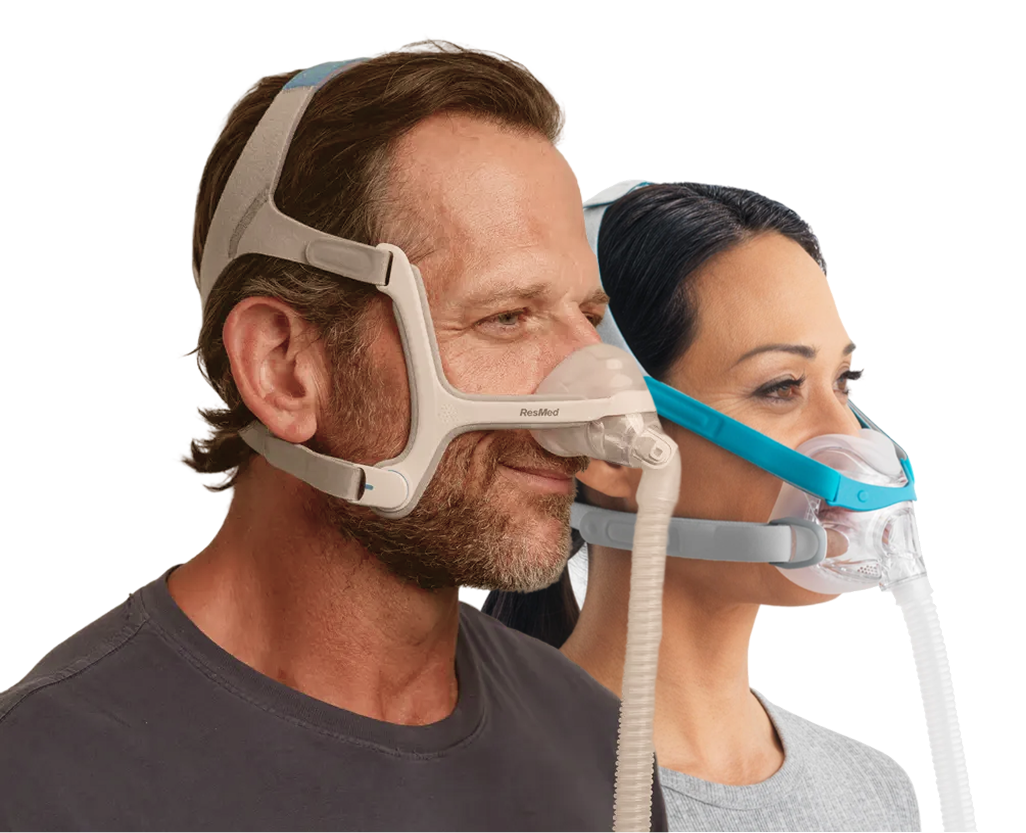Severe sleep apnea is a serious sleep disorder characterized by repeated interruptions in breathing during sleep. This condition can significantly impact health, potentially leading to heart disease, stroke, or persistent fatigue if left untreated. Recognizing key symptoms - such as loud snoring, gasping for air while sleeping, and excessive daytime drowsiness - is essential for timely intervention. In this article, CPAP Discount Warehouse explores the causes and symptoms of sleep apnea, along with effective treatments for sleep apnea.
What is Severe Sleep Apnea?
Sleep apnea is a serious sleep problem. It causes breathing to stop and start repeatedly while you sleep. There are 3 types of sleep apnea:
+ If you have obstructive sleep apnea (OSA), the muscles in your upper airway relax while you're sleeping. This can block your airways and make it hard to breathe. This can make it hard to breathe at first, but your breathing will start again once your reflexes kick in.
+ People with central sleep apnea (CSA) have a problem with their breathing. The brain stops sending signals to the rest of the body that control breathing.
You have severe sleep apnea if your breathing stops and starts more than 30 times an hour.
+ Complex sleep apnea syndrome is a type of sleep apnea that combines OSA and central sleep apnea
The apnea-hypopnea index (AHI) is a way to measure sleep apnea. It can be used to determine the severity of sleep apnea, ranging from mild to severe.
Severe obstructive sleep apnea means that your apnea-hypopnea index (AHI) is greater than 30 (more than 30 episodes per hour). AHI measures how often breathing pauses (apneas) or becomes shallow (hypopneas) per hour.

Severe sleep apnea symptoms
In severe OSA, breathing may be interrupted more than 30 times per hour. If this is not treated or diagnosed, it can lead to serious, even life-threatening, consequences. Its symptoms are often pronounced and typically persist over an extended period. Below are the most common signs of this condition:
+ Loud snoring and episodes of stopped breathing during sleep.
+ Abrupt awakenings from sleep, often accompanied by choking or gasping.
+ Mood changes or irritability.
+ Nighttime sweating.
+ Daytime sleepiness.
+ Difficulty with concentration and memory.
+ Dry mouth or sore throat.
+ Morning headaches, fatigues.

Severe sleep apnea risk factors
Several factors can increase the risk of developing severe sleep apnea, including:
-
Overweight or obese: Being overweight is the higher risk factor. More than 20% of people with obesity have sleep apnea, compared to only about 3% of those with a healthy weight. Extra fat around the neck can block the airway during sleep.
-
Male gender: According to the ALA, men are two to three times more likely to have sleep apnea than women before menopause. After menopause, the risk becomes similar for both genders.
-
Family history: If a close family member has sleep apnea, your chances of developing it are higher.
-
Age older: The ALA says that sleep apnea is more common as people get older. It becomes more common after a person turns 60 or 70.
-
Smoking: Smoking causes airway inflammation and fluid retention, making sleep apnea more common among smokers.
-
Underlying Health Conditions: Conditions such as high blood pressure, diabetes, and asthma can elevate the risk.
-
Chronic Nasal Congestion: Persistent nasal blockage doubles the chances of developing sleep apnea.
-
Narrowed Airways: Structural issues like enlarged tonsils or adenoids can restrict airflow, further increasing susceptibility.
>>>> The Link Between Obesity and Sleep Apnea
Severe sleep apnea causes
The American Sleep Apnea Association (ASAA) warns that untreated sleep apnea can lead to severe health complications, including:
-
Heart failure
-
High blood pressure
-
Stroke
-
Depression
-
Diabetes
-
Hypertension
-
Death
-
Motor Accidents
-
Impotence
Additionally, sleep apnea increases the risk of accidents, particularly due to drowsiness while driving, posing a significant safety concern.
Does sleep apnea affect children?
About 20% of children who snore have obstructive sleep apnea. Surgery to remove the tonsils and adenoids is the most common treatment for this condition in children, but positive airway pressure (PAP) therapy and oral appliances are also prescribed.
Diagnosis of Severe Sleep Apnea
Diagnosing severe sleep apnea involves a comprehensive sleep study, where your breathing and sleep patterns are monitored. This assessment can take place in a specialized in-lab study (Polysomnogram) or home sleep study
Additionally, the doctor will evaluate your throat, neck, and mouth, while reviewing your medical conditions and sleep-related symptoms. In some cases, a blood test may be required to rule out underlying conditions like hypothyroidism.
Severe sleep apnea treatments
Untreated sleep apnea can lead to serious health complications. However, various effective treatment options are available, customized to each individual's condition and its severity. For those with severe sleep apnea, the following treatments are commonly recommended.
Lifestyle changes
Individuals with severe sleep apnea are advised to adopt key lifestyle changes to enhance their health, including:
-
Maintaining a Healthy Weight
-
Quitting Smoking
-
Engaging in Regular Exercise
-
Limiting Alcohol Consumption
Continuous Positive Airway Pressure (CPAP)
Air pressure delivered through a mask helps keep your airways open while you sleep. Some people find CPAP machine uncomfortable at first, but they are one of the most effective treatments for severe sleep apnea. There are different types of CPAP masks and machines. Doctors can adjust the settings to make it more comfortable.
Bi-level Positive Airway Pressure (BiPAP)
Bi-level Positive Airway Pressure (BiPAP) therapy is a non-invasive treatment for severe obstructive sleep apnea (OSA). Especially beneficial for individuals who struggle with CPAP machines.
BiPAP devices provide two distinct air pressure levels:
-
Higher Inhalation Pressure (IPAP): Supports breathing by keeping the airway open during inhalation.
-
Lower Exhalation Pressure (EPAP): Reduces resistance, making exhalation more comfortable.
Surgery
Some people need surgery to remove tissue or clear a blocked airway. There are several common surgical options:
- Tonsillectomy (surgery to remove the tonsils).
- Uvulopalatopharyngoplasty.
- Inspire (hypoglossal nerve implant).
Oral appliances
Dental devices help keep the airway open by adjusting the position of the jaw and tongue. They are particularly effective for individuals with mild to moderate OSA and can sometimes aid in severe cases. Many people find them more comfortable than CPAP machines, and their compact design makes them convenient for travel. However, for the best results, it is essential to consult a dentist or orthodontist specializing in sleep apnea treatment.

>>> BiPAP vs CPAP: How It Works and What's the Difference?
Choosing the Right CPAP Machine in Australia
There are some big differences between an APAP, BiPAP, and CPAP machine, but the best one for you depends on your needs. Continuous positive airway pressure (CPAP) therapy is the best way to treat obstructive sleep apnea symptoms and sleep well at night.
Automatic machines are usually much more expensive than fixed-pressure CPAP machines because they use better technology. However, an APAP machine may be more comfortable because it adjusts the pressure for you throughout the night. In the long term, it can adapt to your lifestyle and may be an effective treatment for sleep apnea.
All the machines are equally effective. If you want a full sleep therapy experience, it's best to get a machine that accounts for lower pressure and higher pressure therapy settings, as well as upgraded features.
If you have obstructive sleep apnea, CPAP treatment is the best option for reducing your symptoms. But if these devices don't work for you, other treatments may help. Some options include sleep medicine or making lifestyle changes, like losing weight. These can help reduce the effects of sleep apnea.
Top 3 best CPAP machine for severe sleep apnea
If you have a more severe case of sleep apnea, you may need a BiPAP machine. ResMed Lumis 100 VPAP S 4G often use two levels of pressure (inspiratory and expiratory) to help people who have a hard time breathing.
Some patients may only need one fixed air pressure, and therefore need a CPAP machine. An auto-PAP (APAP) machine such as ResMed AirSense 10 AutoSet / AirSense 11 AutoSet automatically adjusts the air pressure given to the patient. This is important because things like weight and sleep position can change and affect how bad apnea events are.
Signs a CPAP machine is not working
If you still have symptoms of sleep apnea or other problems with your CPAP machine, your doctor may suggest a different mask or adjust the settings. They may also make other changes to help a person sleep better and manage their sleep apnea.
The National Heart, Lung, and Blood Institute (NHLBI), a trusted source of information, suggests that people contact a sleep specialist if they experience:
+ There is air leaking from the mask.
+ The mask doesn't fit well.
+ Some people feel uncomfortable.
+ The person still has symptoms of sleep apnea.
+ Trouble falling or staying asleep.
+ You might have dry eyes or a dry mouth.
+ A runny or stuffy nose.
FAQs
What are the side effects of severe sleep apnea?
Common health problems, such as diabetes and heart disease, are often connected to severe sleep apnea.
What is a severe sleep apnoea score?
Your AHI score shows how severe your sleep apnoea is: AHI of 5 to 14 = mild. AHI of 15 to 30 = moderate. AHI over 30 = severe.
Can severe sleep apnea kill you?
Some studies have found a link between sleep apnea and health problems like type 2 diabetes, strokes, and heart attacks. People with severe obstructive sleep apnea are more likely to have a higher risk of fatal events, like cancer.
Can sleep apnea be cured?
Sleep apnea is a long-lasting health problem. This means it's ongoing and not something that can be cured. However, it can be treated successfully. The good news is that, depending on the cause of someone's sleep apnea, the symptoms and complications can be reduced or eliminated.
Conclusion
Severe sleep apnea is a serious condition that can lead to significant health issues if not treated. Recognizing the symptoms early and seeking medical advice are essential. Treatment options include lifestyle changes, CPAP and BiPAP therapy, oral devices, and surgery. Visit our website to find top-rated CPAP machines from trusted brands like ResMed, F&P, and Philips. Shop easily at CPAP Discount Warehouse.






